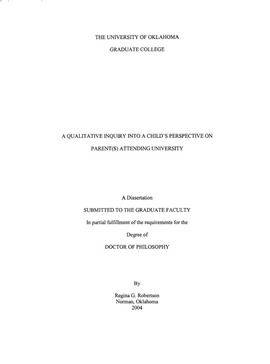| dc.contributor.advisor | Karpiak, Irene, | en_US |
| dc.contributor.author | Robertson, Regina G. | en_US |
| dc.date.accessioned | 2013-08-16T12:19:25Z | |
| dc.date.available | 2013-08-16T12:19:25Z | |
| dc.date.issued | 2004 | en_US |
| dc.identifier.uri | https://hdl.handle.net/11244/735 | |
| dc.description.abstract | Adult learners return to and participate in post-secondary education, many of whom are parents. Student-parents question the impact of their participation in higher education on their children. To address this issue, an interpretative inquiry explored the shared perceptions of 19 children between the ages of 10 and 13. A free-association, clustering exercise as well as one-on-one interviews allowed the researcher to hear the voice of the children. The study suggested that although the children largely supported their parents' endeavors, did not necessarily "like" their parents attending college. Periodical absences, inattentiveness of parents, and stress in the home contributed to this dissatisfaction. The study suggested several factors that impacted the children. It appeared as if the primary factor was the connection the child felt with the university. The connection to the university was closely associated with the distance the family resided from the university. Children whose parents commuted had little knowledge of the university culture and the individuals involved in that aspect of their parents lives. However, children who were familiar with the university felt as if they were a partner in their parent's education. The study suggested that children also tended to blame the university for stress and other negative factors that occur in the home. When the university is in session, home life is somewhat chaotic, resulting in a stressful environment. When school is not in session, however, home life is more relaxed, with parents using this opportunity to be more in tune with their child's needs. Each of the children interviewed were involved in extra-curricular activities. The study seemed to suggest that extra-curricular activities were used to not only provide the children with adult-supervised activities, but also to provide an opportunity for children to be occupied while parents used their time to study or take care of other tasks. Children further appeared to feel as if there would be an immediate change in their life after their parents' graduation due to implied or promises of more money, new home, and vacations to their children. Various strategies were discussed to better prepare both child and parent for college. | en_US |
| dc.format.extent | ix, 129 leaves : | en_US |
| dc.subject | Adult college students Family relationships. | en_US |
| dc.subject | Sociology, Individual and Family Studies. | en_US |
| dc.subject | Parent and child. | en_US |
| dc.subject | Children of working parents Social conditions. | en_US |
| dc.subject | Children of working parents Attitudes. | en_US |
| dc.subject | Education, Higher. | en_US |
| dc.subject | Education, Adult and Continuing. | en_US |
| dc.title | A qualitative inquiry into a child's perspective on parent(s) attending university. | en_US |
| dc.type | Thesis | en_US |
| dc.thesis.degree | Ph.D. | en_US |
| dc.thesis.degreeDiscipline | Department of Educational Leadership and Policy Studies | en_US |
| dc.note | Source: Dissertation Abstracts International, Volume: 65-04, Section: A, page: 1279. | en_US |
| dc.note | Adviser: Irene Karpiak. | en_US |
| ou.identifier | (UMI)AAI3127801 | en_US |
| ou.group | Jeannine Rainbolt College of Education::Department of Educational Leadership and Policy Studies | |
